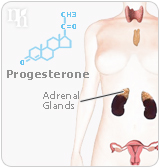
Progesterone is a naturally occurring steroid hormone and promotes development of the normal mammary gland. It is an important hormone manufactured by the adrenal glands in men and women, and in the ovaries in women. Extra amounts are manufactured by the placenta during pregnancy. Progesterone is responsible for numerous functions taking place that are necessary for optimum health.
What Is a Hormone?
Hormones are substances secreted directly into the bloodstream and are produced by several glands and organs in your body such as the ovaries, testes, thyroid, pancreas, pituitary, liver, and others. Hormones, including progesterone, travel through the bloodstream from where they are produced to where they interact with receptors to do the work for which they were intended. They initiate reactions in the body, whereas enzymes usually help to facilitate them. Hormones regulate fluid retention, mineral metabolism, sexual function and libido, reproductive functions, growth and development, aging and numerous other functions.
Why Is Progesterone an Essential Hormone?

Progesterone is capable of transforming itself into estrogen and adrenal steroids. (Adrenal steroids get used up during stress reactions). It also regulates other vital organ functions, including thyroid performance, glucose metabolism, mood and mineral mechanisms. When we are oversaturated with estrogen (produced naturally) or estrogen-like substances (obtained from food or environmental pollutants and even from excessive growth of Candida albicans in the gut) we do not seem to be able to compensate with an adequate production of progesterone.
Why Are We All Progesterone-Deficient?
Contamination of our food supply, pollutants, poor gut ecological balance, poor nutrient status, excessive stress, and estrogen dominance are all contributing factors to progesterone deficiency, which is not uncommon among women.
When Are Progesterone Levels Considered to Be Excessive?
High progesterone in a woman's body cause many symptoms, including: breast tenderness, mood swings, anxiety, depression, bloating, and loss of libido. Although these are some of the most common symptoms of high progesterone, there are other less common side effects of high progesterone as well. These less common symptoms can include acne and greasy skin, weight gain, hot flashes, urinary infections, headaches, and incontinence. If you experience any of these symptoms it is possible you are suffering from high levels of progesterone.
Progesterone is not the only hormone affected during menopause; other hormone levels are fluctuating as well. To learn more about progesterone and other hormones click on the following link to find out more about progesterone imbalance.
